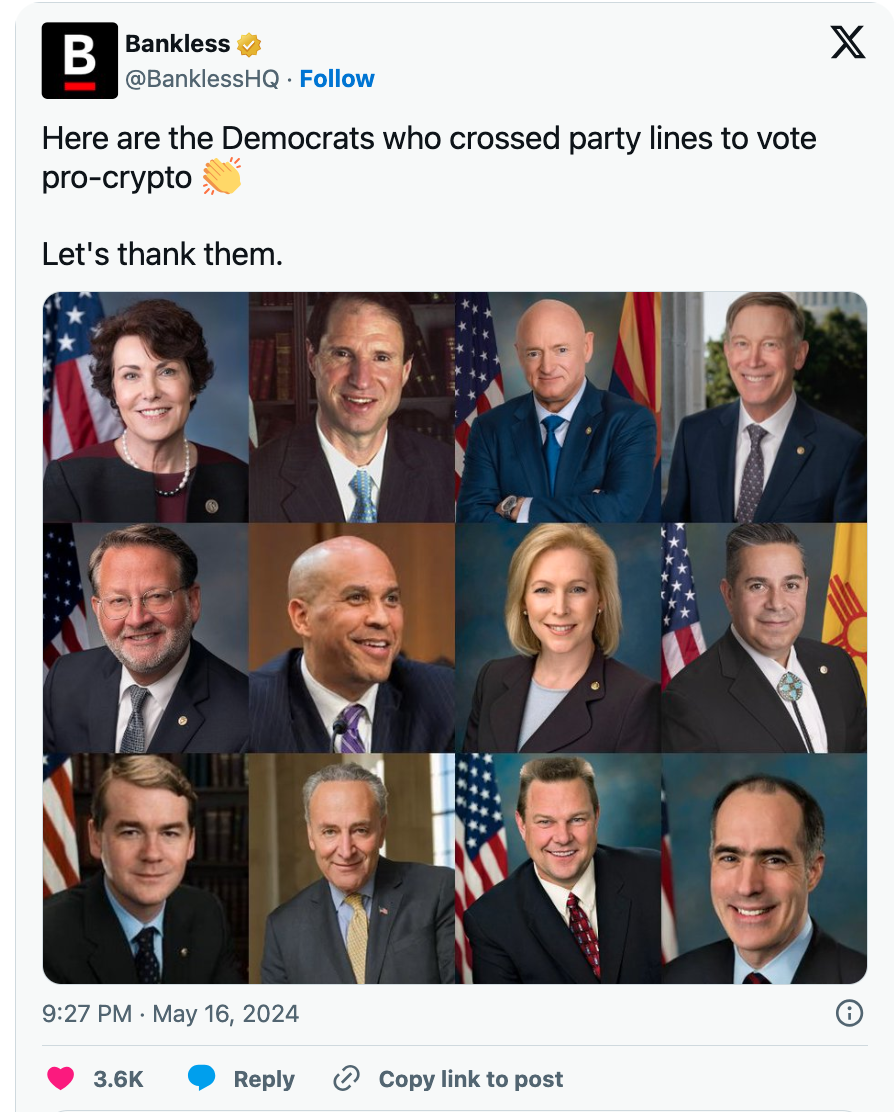As the United States gears up for the 2024 presidential election, cryptocurrencies have emerged as a major topic of debate among the candidates. This development marks a considerable shift from previous elections, reflecting digital assets' growing influence and importance in the financial landscape. Currently, there are both pro-crypto and anti-crypto politicians within the two largest political parties, the Democrats and the Republicans.
Democratic Stance on Cryptocurrencies
The Democratic Party, led by prominent figures such as Senator Elizabeth Warren and Senate Banking Chair Sherrod Brown, generally adopts a skeptical and cautious approach toward cryptocurrencies. They emphasize the need for stringent regulation to protect consumers, prevent financial crimes, and mitigate environmental impacts. Warren, in particular, has been a vocal critic, warning about the risks posed by unregulated crypto markets, including their potential use for money laundering, terrorist financing, and other illicit activities. She argues that stablecoin legislation must include comprehensive anti-money laundering (AML) tools to prevent misuse by rogue nations and criminals.
President Joe Biden's administration initially aimed for a balanced approach, promoting innovation while ensuring financial stability through regulations. However, Biden recently signaled his intent to veto a bipartisan resolution overturning the SEC's controversial crypto accounting guidance (SAB 121). This move aligns him more closely with the party's regulatory hardliners, reinforcing the Democrats' stance against the crypto industry. The SEC, a predominantly Democratic body, has been actively pursuing enforcement actions against various crypto entities, reflecting the broader party agenda to impose stricter controls on the industry.
Republican Stance on Cryptocurrencies
In contrast, the Republican Party generally supports a more permissive regulatory environment for cryptocurrencies, aiming to foster innovation and maintain the United States' competitive edge in the global market. Key Republican figures like Senator Cynthia Lummis, Representative Tom Emmer, and Senator Ted Cruz have introduced legislation to provide clear and comprehensive regulatory frameworks for digital assets. They argue that over-regulation drives innovation overseas, undermining America's position as a leader in technological advancements.
Lummis and Emmer advocate for lighter-handed regulation, emphasizing the need to support financial freedom and independence. Cruz, for instance, highlights Bitcoin's potential for investment and its benefits for Texas's energy grid resilience. These Republicans see cryptocurrencies as a way to check federal power and promote individual financial sovereignty.
Donald Trump's Position
Former President Donald Trump presents a complex figure in the crypto debate. While he has recently tried to court the crypto community, his broader political stances raise concerns about his commitment to the industry's principles. Trump's "America First" policies and nationalist rhetoric often conflict with cryptocurrencies' global and inclusive nature. His administration's actions, criticized for undermining human rights and international cooperation, contrast sharply with the crypto community's decentralized ethos.
Despite his mixed history with the industry, Trump has recently positioned himself as an ally to crypto enthusiasts. At a Mar-a-Lago event for his NFT holders, Trump expressed support for cryptocurrencies, emphasizing the need for the U.S. to remain competitive and avoid hostile regulation. However, many in the crypto world remain wary of his inconsistent record and broader political ideology.
The Growing Influence and Popularity of Cryptocurrencies
As the 2024 election approaches, the debate over cryptocurrency regulation highlights the growing influence of digital assets in mainstream political discourse. The Democratic Party, led by figures like Elizabeth Warren and Sherrod Brown, continues to push for stringent regulation, focusing on consumer protection and financial stability. In contrast, Republicans, including prominent figures like Cynthia Lummis, Tom Emmer, and Ted Cruz, advocate for a more permissive environment to encourage innovation.
Despite skepticism about his broader political stance, Trump's recent overtures to the crypto community underscore the increasing importance of cryptocurrencies in the political arena. The ideological divide between the parties on crypto regulation sets the stage for digital assets to play a pivotal role in the upcoming election, reflecting the sector's evolving place in the financial and political landscape.
The 2024 U.S. presidential election will significantly impact the future of cryptocurrency regulation, with each candidate's stance shaping the industry's trajectory. Whether through stringent regulation or supportive frameworks, the election's outcome will determine how the United States navigates the complex and rapidly evolving world of digital assets.

